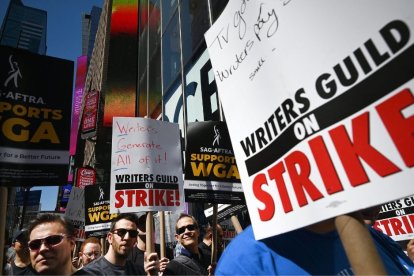The strike is over: Hollywood screenwriters return to work
It is expected that the first shows to resume will be late-night talk shows. Film and TV series productions will take longer as actors continue their strike.

(Cordon Press).
After a 148-day strike, the leadership of the Writers Guild of America voted Tuesday night to officially end the Hollywood writers' strike. The screenwriters will officially resume their jobs on Wednesday at 12:01 a.m. PT.
As explained by the Writers Guild of America (WGA), the Bargaining Committee, the WGAW Board and the WGAE Council (boards of directors of the unions in its Western and Eastern branches, respectively) voted unanimously to recommend the agreement. It will now be submitted for ratification by members of both unions. Voters will be able to vote from Oct. 2 to 9 and will receive the ballot and ratification materials when voting opens.
The WGAW Board and WGAE Council also voted to lift the restraining order and end the strike effective at 12:01 a.m. PT (3:01 a.m. ET) on Wednesday, Sept. 27. This allows writers to return to work during the ratification process, but does not affect the members' right to make a final decision on contract approval.
The first shows to resume are likely to be late-night talk shows, the first to be removed from the programming grid when writers went on strike on May 2. Movies and TV series will take longer to resume, as the actors are still on strike and there are no negotiations on the horizon.
Use of AI and royalties regulated in new agreement
The agreement puts an end to several of the problems raised by screenwriters in their contracts. One of the main concerns for writers was the use of artificial intelligence, which from now on will be regulated in the new document. Thus, AI will not be able to write or rewrite literary material. In addition, scripts written by AI will not be considered original material.
A screenwriter may choose to use AI as a working tool but only with the approval of the studios, which will not be able to force a screenwriter to use AI in his or her writing. Along with this, studios will be required to notify screenwriters if any work they submit to them has been made or incorporates AI-generated material.
Royalties for streaming content, another controversial point in the agreement, have also been settled. From now on, reports The Hollywood Reporter, VOD services will have to share their audience data, including the number of hours played worldwide of a film or series, with the writers' union.
In this way, the WGA will have the data that will ratify that screenwriters receive compensation for their work. A percentage that, in the case of revenue from plays outside the US will be 76% of current figures, while whose name appears on major ratings hits seen by more than 20% of subscribers on a US platform during their first days of broadcast will receive 50% calculated from royalties at home and abroad.
Hollywood's double strike, in numbers
The almost five-month hiatus in Hollywood has seriously affected the nation's economy. It is estimated that the double strike that began with screenwriters in May and which was joined by actors on July 14 may cost the nation $150 million per week.
In total, according to data from Forbes, the strike in Hollywood could mean losses of $4 billion. Certain cities and states are more affected than others. In California, picketing by performers and writers burned a $5 billion hole in the state's economy and is affecting around 700,000 Californians. The most affected jobs are those carried out by catering companies, dry cleaners, truck drivers, car rental companies and other small businesses.
August saw the highest number of working hours lost in a single month in the last 23 years. In that month alone, 4.1 million work days were lost. This is the highest figure since 2000, when several stoppages also caused significant economic consequences.
The days lost due to stoppages are only increasing. If the 4.1 million working days from August are added to those registered in July, the figure grows to 6.4 million. And, so far this year, the number totals 7.4 million days lost, exponentially higher than the 636 days that were recorded in 2022.
RECOMMENDATION




















